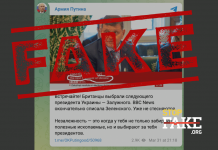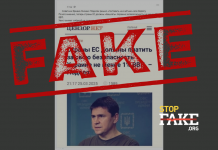After Poland began constructing a fence on the border in response to the migration crisis caused by Belarusian authorities, a new topic emerged in Belarusian propaganda: the environment. Belarusian experts claim that the construction of the fence will disrupt the Białowieża Forest ecosystem, create barriers to animal migration, and negatively affect the unique bison population. This year, the issue of the Białowieża Forest was even raised at the UN Climate Summit in Azerbaijan at the initiative of the Belarusian side.
Lukashenko went to the climate summit in Baku to talk about something completely different from ecology; he is not a big defender of nature, he is used to making money on it. However, since the agenda was strictly limited to the summit’s theme and three-minute speeches, he directed all his environmental accusations at Polish President Andrzej Duda. “They’re cutting down the Białowieża Forest, and he’s talking about plants,” Lukashenko said, commenting on the Polish leader’s speech. He added that Duda failed to mention how Warsaw built a border fence through the Białowieża Forest, allegedly causing animal deaths there.
Lukashenko’s remarks were widely publicized, but later that evening an embarrassing contradiction emerged: a decree bearing his signature was published, permitting hunting of the specially protected bear and lynx in Belarus. Belarusian propaganda ignored this inconsistency, focusing instead on accusing Poland of destroying the Białowieża Forest, as the topic had escalated from a local expert discussion to a high-level political issue.
Poland began constructing a border fence with Belarus in 2022 to prevent the entry of migrants from Africa and the Middle East attempting to reach the EU via Belarus. The fence is 186 kilometers long and 5.5 meters high. It was built across the territory of the Białowieża Forest, a natural complex included on the UNESCO World Heritage list.
The Belarusian authorities disliked the fence from the very beginning. First, it fundamentally undermines Belarus’s image as a “peaceful” neighbor, making it difficult to explain to the electorate why such drastic measures are needed to isolate themselves from the “most peaceful country on the planet.” Second, the Belarusian authorities deny their participation in the migration crisis in every possible way. In their narrative, these are “hundreds of unfortunate refugees fleeing wars started by the West in their countries.” Third, creating a barrier to the flow of refugees means these people will remain in Belarus, leaving the authorities uncertain about what to do with them.
Since the Belarusian authorities cannot influence the construction of the fence on a political level, they decided to focus on environmental issues. Their main argument is that the fence causes significant harm to the forest’s ecosystems, including populations of rare animals, particularly bison. Belarusian experts frequently comment that animals are unable to move freely because the fence is not equipped with the necessary passages and there are stories of animals dying after becoming entangled in the wire.
Representatives of the Belarusian authorities simultaneously attacked international organizations with letters highlighting the dangers of the fence. Appeals were sent to the Council of Europe and the UNESCO mission. UNESCO experts even visited the Belarusian part of the forest to assess the damage caused by the construction of the fence. Belarusian officials expressed their willingness to visit the Polish part of the forest, but the Poles refused, just as they themselves did not agree to come to Belarus.
In general, it seems that Belarusian propaganda pays more attention to the preservation of Polish nature than to its own. Currently, it is actively criticizing the Polish authorities for cutting down forests in the Białowieża Forest to reconstruct a regional road. Every incident involving bison is closely monitored: when military equipment near the border harms animals, Belarusian propaganda launches waves of criticism, accusing Polish authorities of destroying nature in their militaristic fervor. And, of course, there is a sense of resentment towards the Polish side for being unwilling to resume cooperation and for suspending joint projects. Therefore, the only option left for Belarus is to continue criticizing Poland for destroying the Białowieża Forest at every possible international forum.





